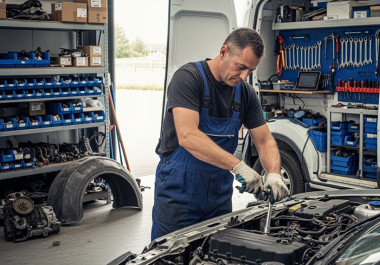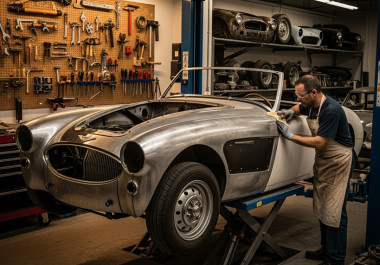Your car’s DPF, or diesel particulate filter, may not be a component you’re hugely familiar with unless you’re a mechanic, or a self-described petrol-head. And that’s fine – most of us won’t have a lot of interaction with it in our day-to-day driving lives. But it plays a crucial role in helping to clean up the emissions of diesel vehicles, so it’s something that always needs to be kept in good repair. So whether you’re driving a brand new car or a second-hand model you’ve acquired through one of our online vehicle auctions here at RAW2K, here’s what you need to know about your DPF.
What is a DPF?
As we’ve touched on above, DPF stands for diesel particulate filter. Basically, it's a key component in the exhaust system of diesel vehicles, primarily designed to trap and remove soot or particulate matter emitted from the engine during the combustion process. In other words, it limits the harmful particles that the engine emits when you’re driving it.
These particles, if released into the atmosphere, can contribute to air pollution and pose health risks. The DPF essentially acts as a barrier, capturing these harmful particles before they exit the vehicle's tailpipe.
How does a DPF work?
Your DPF works through a process called filtration. As exhaust gases pass through the filter, the particulate matter becomes trapped in the microscopic channels or porous structure of the filter material. (If you think of a fishing net over an outflow pipe, largely the same principles are at play.)
Of course, over time, as more particles accumulate, the filter needs to be cleaned to maintain optimal performance. That cleaning process is referred to as regeneration – it involves the trapped particles being burned off, typically at high temperatures, leaving ash residue behind. To be clear, that regeneration process happens automatically – it’s not a specialised process that mechanics have to carry out specifically.
Why is a DPF important?
There’s a long answer and a short answer to that question. The short answer you’ve probably worked out already – effectively a Diesel Particulate Filter protects public health. That includes the driver of the vehicle, and anyone in its immediate vicinity – whether they’re pedestrians, cyclists, or fellow drivers.
The longer answer encompasses a couple of different factors. These include:
- Emissions control: As we’ve covered, DPFs play a significant role in reducing harmful emissions from diesel vehicles, helping to meet stringent environmental regulations and standards. By capturing particulate matter, your DPF helps minimise air pollution and improve air quality, especially in urban areas
- Health benefits: Directly linked to our point about emissions control. Particulate matter emitted from diesel engines has been linked to respiratory problems and cardiovascular diseases. Trapping these particles means that DPFs can help mitigate health risks associated with exposure to diesel exhaust fumes.
- Vehicle performance: A properly functioning DPF ensures optimal engine performance and fuel efficiency, essentially by maintaining clean exhaust systems. Specifically, DPFs help prevent exhaust backpressure, which can have a major impact on engine power and responsiveness.
- Legal compliance: Due in large part to the points above, many countries (including the UK) have implemented regulations mandating the use of DPFs in diesel vehicles – from cars and vans to buses and HGVs. Those laws apply to all drivers, from fleet vehicles to personal cars – so it’s always worth taking the time to ensure that yours is in good condition.
How to look after your DPF
If you’re not a professional mechanic, there’s not much you can do specifically in terms of DPF maintenance – most of it will come down to how you drive your car. As long as you’re driving sensibly and relatively regularly, you shouldn’t have to worry about too much.
Some do’s:
- Regular driving, including relatively regular motorway driving at moderate speeds. This facilitates the ‘regeneration’ process we’ve discussed above
- Schedule regular servicing and preventative maintenance, as this can save you more money in the short term rather than reacting to an issue as and when it arises
Some don’ts:
- Ideally, try and avoid frequent short-distance or low-speed trips, as this can put the DPF under more strain and result in it becoming clogged
- Don’t modify your vehicle or engine system, as this can easily disrupt the DPF’s performance and potentially even make your car illegal to run
That’s all the essentials covered! Of course, if you’re on the lookout for spare parts like DPF filters or brake discs, you can find all sorts of salvage cars for just that purpose here at RAW2K. Alternatively, you can even find relatively intact used cars for use as your own personal runaround. We’ve got a variety of models from leading manufacturers, including Vauxhall, Renault, Peugeot and Audi. Why not take a look around our site, and see what you can find?




